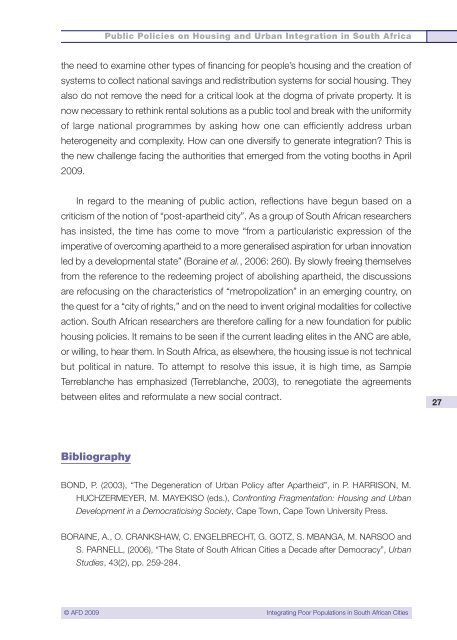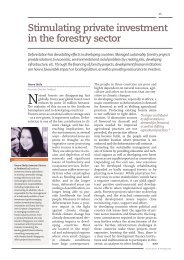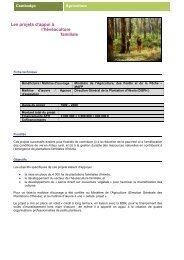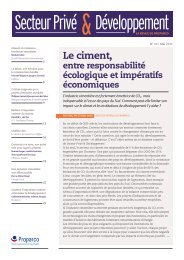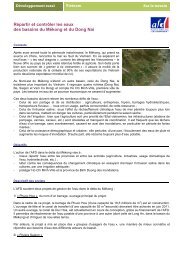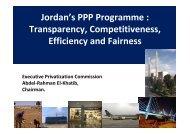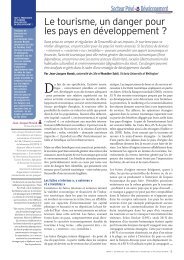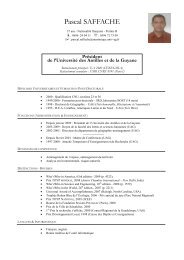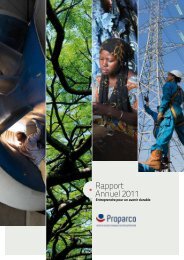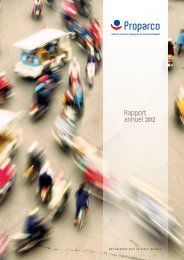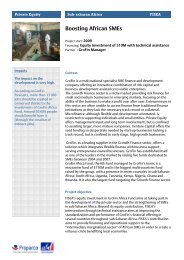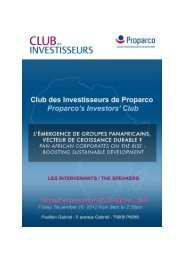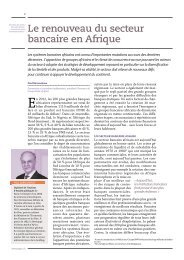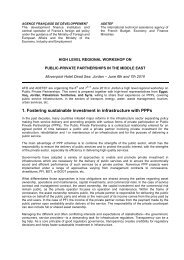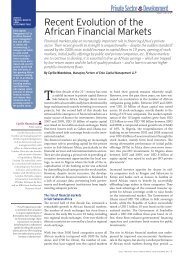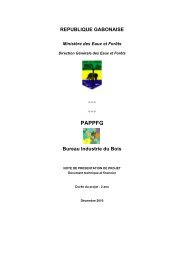Integrating Poor Populations in South African Cities - Agence ...
Integrating Poor Populations in South African Cities - Agence ...
Integrating Poor Populations in South African Cities - Agence ...
Create successful ePaper yourself
Turn your PDF publications into a flip-book with our unique Google optimized e-Paper software.
Public Policies on Hous<strong>in</strong>g and Urban Integration <strong>in</strong> <strong>South</strong> Africa<br />
the need to exam<strong>in</strong>e other types of f<strong>in</strong>anc<strong>in</strong>g for people’s hous<strong>in</strong>g and the creation of<br />
systems to collect national sav<strong>in</strong>gs and redistribution systems for social hous<strong>in</strong>g. They<br />
also do not remove the need for a critical look at the dogma of private property. It is<br />
now necessary to reth<strong>in</strong>k rental solutions as a public tool and break with the uniformity<br />
of large national programmes by ask<strong>in</strong>g how one can efficiently address urban<br />
heterogeneity and complexity. How can one diversify to generate <strong>in</strong>tegration? This is<br />
the new challenge fac<strong>in</strong>g the authorities that emerged from the vot<strong>in</strong>g booths <strong>in</strong> April<br />
2009.<br />
In regard to the mean<strong>in</strong>g of public action, reflections have begun based on a<br />
criticism of the notion of “post-apartheid city”. As a group of <strong>South</strong> <strong>African</strong> researchers<br />
has <strong>in</strong>sisted, the time has come to move “from a particularistic expression of the<br />
imperative of overcom<strong>in</strong>g apartheid to a more generalised aspiration for urban <strong>in</strong>novation<br />
led by a developmental state” (Bora<strong>in</strong>e et al., 2006: 260). By slowly free<strong>in</strong>g themselves<br />
from the reference to the redeem<strong>in</strong>g project of abolish<strong>in</strong>g apartheid, the discussions<br />
are refocus<strong>in</strong>g on the characteristics of “metropolization” <strong>in</strong> an emerg<strong>in</strong>g country, on<br />
the quest for a “city of rights,” and on the need to <strong>in</strong>vent orig<strong>in</strong>al modalities for collective<br />
action. <strong>South</strong> <strong>African</strong> researchers are therefore call<strong>in</strong>g for a new foundation for public<br />
hous<strong>in</strong>g policies. It rema<strong>in</strong>s to be seen if the current lead<strong>in</strong>g elites <strong>in</strong> the ANC are able,<br />
or will<strong>in</strong>g, to hear them. In <strong>South</strong> Africa, as elsewhere, the hous<strong>in</strong>g issue is not technical<br />
but political <strong>in</strong> nature. To attempt to resolve this issue, it is high time, as Sampie<br />
Terreblanche has emphasized (Terreblanche, 2003), to renegotiate the agreements<br />
between elites and reformulate a new social contract.<br />
27<br />
Bibliography<br />
BOND, P. (2003), “The Degeneration of Urban Policy after Apartheid”, <strong>in</strong> P. HARRISON, M.<br />
HUCHZERMEYER, M. MAYEKISO (eds.), Confront<strong>in</strong>g Fragmentation: Hous<strong>in</strong>g and Urban<br />
Development <strong>in</strong> a Democraticis<strong>in</strong>g Society, Cape Town, Cape Town University Press.<br />
BORAINE, A., O. CRANKSHAW, C. ENGELBRECHT, G. GOTZ, S. MBANGA, M. NARSOO and<br />
S. PARNELL, (2006), “The State of <strong>South</strong> <strong>African</strong> <strong>Cities</strong> a Decade after Democracy”, Urban<br />
Studies, 43(2), pp. 259-284.<br />
© AFD 2009 <strong>Integrat<strong>in</strong>g</strong> <strong>Poor</strong> <strong>Populations</strong> <strong>in</strong> <strong>South</strong> <strong>African</strong> <strong>Cities</strong>


